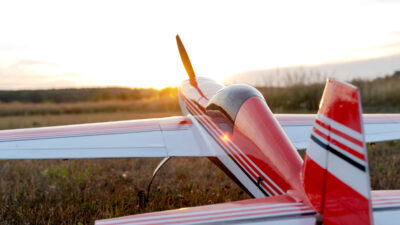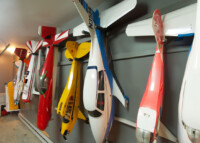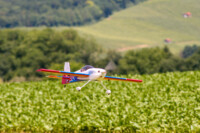Do You Need Permission to Fly an RC Airplane?
7 November 2023 | Updated on November 09, 2023
Are you an RC airplane enthusiast looking to take to the skies? One question you may have is whether or not you need permission to fly your RC airplane. The answer is, it depends on the weight of your aircraft. Let’s explore the regulations and guidelines surrounding RC airplane flying.

Key Takeaways:
- If your RC airplane weighs less than 250 grams, you do not need to register with the FAA.
- RC airplanes weighing more than 250 grams require registration with the FAA.
- Recreational flyers must adhere to specific rules set by the FAA to ensure safety.
- Commercial use of RC airplanes requires a Part 107 license from the FAA.
- Choose suitable locations for flying, such as RC flying clubs or private property with permission.
What are the Rules for Recreational Flyers?
Recreational flyers must adhere to certain rules set by the FAA to ensure the safety of people, aircraft, and airspace. These rules are designed to promote responsible and enjoyable flying experiences for hobbyists. Let’s take a closer look at the key regulations that recreational flyers need to follow:
Flying for personal enjoyment
Recreational flyers are allowed to operate their RC aircraft solely for personal enjoyment. The primary purpose should be for recreational purposes, and not for any commercial or business activities. This means that using your RC airplane to capture aerial footage for profit or conducting drone deliveries would require a Part 107 license.
Keeping the aircraft within line of sight
Recreational flyers must keep their RC aircraft within their visual line of sight at all times, or use a visual observer to assist in maintaining visual contact with the aircraft. This rule ensures that operators have direct and immediate control over their aircraft, minimizing the risk of collisions or other accidents.
Following altitude and airspace restrictions
When flying as a recreational flyer, it is important to adhere to authorized altitudes and airspace restrictions. Recreational flyers are allowed to fly at or below 400 feet in uncontrolled airspace. This helps prevent interference with manned aircraft and ensures the safety of everyone in the airspace. It’s essential to check for any temporary flight restrictions or controlled airspace in your area before flying.

Passing the Recreational UAS Safety Test (TRUST)
As of June 2021, recreational flyers are required to pass the Recreational UAS Safety Test (TRUST) administered by the FAA. This test covers essential knowledge about airspace, operating rules, and safe flying practices. It is a free online test that can be taken through an FAA-approved partner. Upon passing the test, recreational flyers receive a proof of test passage, which they must carry while flying their RC aircraft.
| Rules for Recreational Flyers | Description |
|---|---|
| Flying for personal enjoyment | Recreational flyers must use their RC aircraft solely for personal enjoyment and not engage in commercial activities. |
| Keeping the aircraft within line of sight | Recreational flyers must maintain direct visual contact with the RC aircraft or utilize a visual observer. |
| Following altitude and airspace restrictions | Recreational flyers should fly at or below 400 feet in uncontrolled airspace and adhere to authorized altitudes. |
| Passing the Recreational UAS Safety Test (TRUST) | Recreational flyers must successfully complete the TRUST test to demonstrate knowledge of safe flying practices. |
“Following these rules is crucial to ensure the safety of the pilot, other aircraft, and people on the ground. It’s essential for recreational flyers to take their responsibilities seriously and be aware of the regulations set by the FAA. By doing so, we can all enjoy the thrill and excitement of flying RC airplanes while maintaining a safe and enjoyable environment.” – FAA spokesperson
By complying with these regulations, recreational flyers can have a fulfilling and safe flying experience. It is important to stay updated on any changes in the rules and regulations and always prioritize safety when operating an RC aircraft.
How to Register Your RC Airplane
If you own an RC airplane that weighs more than 250 grams, it is important to register it with the Federal Aviation Administration (FAA). Registering your aircraft is a straightforward process that can be done online. Here are the steps to follow:
- Visit the FAA’s registration website. You can find the link on the FAA’s official website or by conducting a simple internet search.
- Create an account. Provide your personal information, including your name, address, email, and phone number.
- Enter your aircraft details. Provide the make and model of your RC airplane, as well as the specific Remote ID serial number if applicable.
- Complete the payment process. The registration fee for small aircraft is $5, which is valid for three years. The FAA accepts credit and debit card payments.
- Receive your registration certificate. Once your registration is complete and payment is processed, you will receive a unique registration number. You must mark this number on your RC airplane for identification purposes.
It is important to note that registration is required for each individual aircraft. If you own multiple RC airplanes, you will need to register each one separately. The registration cannot be transferred between different types of aircraft.
Why Registering Your RC Airplane is Important
“Registering your RC airplane with the FAA provides a level of accountability and ensures the safety of the airspace. It allows authorities to track the ownership of RC aircraft and hold individuals responsible for any violations or incidents that may occur.”
By registering your RC airplane, you demonstrate your commitment to being a responsible pilot and contribute to maintaining the safety of the airspace for yourself and others.
Part 107 License for Commercial Use
If you plan on using your RC airplane for commercial purposes, such as conducting business activities or educational programs, you will need to obtain a Part 107 license from the FAA. This license is required to ensure safety and regulatory compliance in commercial operations. To obtain the Part 107 license, you will need to pass a certification test and complete the necessary paperwork.
The certification test covers various topics, including airspace regulations, weather conditions, emergency procedures, and operational limitations. It is essential to study and prepare for the exam to ensure a successful outcome. Once you have passed the test, you can apply for your Part 107 license through the FAA’s online portal.
Commercial Drone Registration
In addition to obtaining the Part 107 license, you will also need to register your RC aircraft under the Part 107 regulations. This registration process ensures that your commercial drone is properly identified and linked to your license. It is important to note that not all RC planes fall under the Part 107 regulation. If your aircraft is exempt from the Part 107 requirements, you will still need to follow the appropriate guidelines and restrictions set by the FAA for recreational flyers.
By obtaining the Part 107 license and registering your commercial RC airplane, you demonstrate your commitment to safety, professionalism, and compliance with federal regulations. Always remember to adhere to the guidelines and limitations set by the FAA to ensure the safe operation of your RC aircraft in commercial settings.

| Key Points | Details |
|---|---|
| License Requirement | Part 107 license is required for commercial use of RC airplanes. |
| Certification Test | Passing a certification test is necessary to obtain the license. |
| Registration | RC aircraft used for commercial purposes must be registered under Part 107 regulations. |
| Compliance | Comply with FAA guidelines and regulations to ensure safety and regulatory compliance. |
By following the necessary steps and meeting the requirements, you can legally use your RC airplane for commercial activities while ensuring the safety and well-being of everyone involved.
Exception for Recreational Flyers
Recreational flyers who solely engage in flying RC airplanes for personal enjoyment and have no intentions of using them for commercial purposes are exempt from obtaining a Part 107 license. Instead, they fall under the Exception for Recreational Flyers rules set by the Federal Aviation Administration (FAA).
As of June 2021, recreational flyers are now required to take the Recreational UAS Safety Test (TRUST) and carry proof of test passage when flying. The TRUST test is a free online assessment administered by FAA-approved partners. It covers topics such as airspace requirements, operating rules, and best practices for safe flying. By passing the TRUST test, recreational flyers demonstrate their knowledge and commitment to flying responsibly.
Registering your RC aircraft is also a requirement for recreational flyers. However, unlike commercial operators who need to register each individual aircraft, recreational flyers can register multiple aircraft under a single registration number. This streamlines the registration process and allows recreational flyers to enjoy their hobby without the need for separate registrations for each aircraft.
Flying under the Exception for Recreational Flyers
Under the Exception for Recreational Flyers rules, there are a few key guidelines that recreational flyers must follow. These include flying within the pilot’s line of sight or using a visual observer, giving way to other aircraft, flying at or below authorized altitudes, and flying at or below 400 feet in uncontrolled airspace. Adhering to these guidelines helps ensure the safety of people, aircraft, and airspace while enjoying the thrill of flying RC airplanes.
In summary, recreational flyers can take advantage of the Exception for Recreational Flyers rules, which allow them to fly RC airplanes for personal enjoyment without the need for a Part 107 license. By passing the TRUST test and registering their aircraft, recreational flyers demonstrate their commitment to safe and responsible flying. Adhering to the guidelines set by the FAA helps ensure a positive and enjoyable experience for all RC aviation enthusiasts.
Where Can You Fly an RC Airplane?
When it comes to flying an RC airplane, it is crucial to choose the right location to ensure safety and compliance with regulations. Here are some options for where you can fly your RC airplane:
- RC Flying Clubs: Joining an RC flying club is a great way to connect with other enthusiasts and find designated flying fields. These clubs often have specific areas set aside for RC aircraft, providing a supportive and controlled environment for flying.
- Private Property: If you have access to private property, such as a large backyard or a field with the owner’s permission, it can be an ideal location for flying your RC airplane. Just make sure to adhere to any local noise regulations and be considerate of neighboring properties.
- Public Land: Some public lands allow RC airplane enthusiasts to fly their aircraft. However, always check with the land management agency or local authorities to ensure that flying RC airplanes is permitted in the specific area you plan to use. Be mindful of any restrictions or guidelines that may be in place.

“Flying with other enthusiasts at a designated RC flying club can enhance your experience while providing a safe and controlled environment for flying. It’s a great opportunity to learn from others, exchange tips, and enjoy the camaraderie of fellow RC airplane enthusiasts.”
Additional Considerations
When choosing a location to fly your RC airplane, it is important to research and understand the regulations specific to your area. State and local governments, national parks, and other authorities may have additional rules and restrictions that you need to follow. Respect these guidelines to ensure the safety of yourself, others, and the surrounding environment.
Always fly your RC airplane responsibly and with consideration for others. Follow the general rules of flying, such as keeping your aircraft within your line of sight and giving way to other aircraft if necessary. By doing so, you can enjoy the thrill of flying your RC airplane while maintaining safety and adhering to the regulations.
| Location | Pros | Cons |
|---|---|---|
| RC Flying Clubs | – Designated flying fields – Support and guidance from fellow enthusiasts – Controlled environment |
– Membership fees – Less flexibility in choosing flying locations |
| Private Property | – Convenience and accessibility – Flexibility in scheduling |
– Noise restrictions – Limited space |
| Public Land | – Variety of locations to choose from – Potential for more open space |
– Restrictions and guidelines – Need for approval or permits |
Table: Pros and Cons of Different Flying Locations for RC Airplanes
Conclusion
In conclusion, flying an RC airplane can be an enjoyable hobby for recreational enthusiasts. However, it is crucial to understand and follow the regulations set by the Federal Aviation Administration (FAA) to ensure safety and compliance.
If your RC airplane weighs less than 250 grams, you do not need to register with the FAA. For aircraft weighing more than 250 grams, registration is required. Recreational flyers must adhere to specific rules, including keeping the aircraft within their line of sight, flying at or below authorized altitudes, and passing the Recreational UAS Safety Test (TRUST).
For those interested in using their RC airplane for commercial purposes, obtaining a Part 107 license is necessary. This involves passing a certification test and registering the aircraft under Part 107 regulations.
Remember to research and understand the regulations in your area, seek permission when flying on private property, and choose suitable locations. By following the rules and guidelines, you can safely and responsibly enjoy the thrill of flying an RC airplane.
FAQ
Do I need permission to fly an RC airplane?
Whether or not you need permission to fly an RC airplane depends on the weight of the aircraft. RC airplanes weighing less than 250 grams do not need to be registered with the FAA, while those weighing more than 250 grams require registration.
What are the rules for recreational flyers?
Recreational flyers must adhere to certain rules set by the FAA, including flying only for personal enjoyment, keeping the aircraft within the pilot’s line of sight or using a visual observer, giving way to other aircraft, flying at or below authorized altitudes, flying at or below 400 feet in uncontrolled airspace, passing the Recreational UAS Safety Test (TRUST), and carrying proof of registration and test passage.
How do I register my RC airplane?
To register your RC airplane with the FAA, you will need to provide your physical and mailing addresses, email address, phone number, make and model of your RC aircraft, specific Remote ID serial number (if applicable), and credit or debit card information. The registration fee for small aircraft (less than 55 pounds) is $5 and is valid for three years.

Do I need a Part 107 license for commercial use?
Yes, if you intend to use your RC airplane for commercial purposes, such as for business or educational activities, you will need to obtain a Part 107 license from the FAA. This license requires passing a certification test and completing the necessary paperwork.
What is the Exception for Recreational Flyers?
If you fly your RC airplane solely for recreational purposes and have no intention of using it for commercial activities, you do not need a Part 107 license. However, as of June 2021, recreational flyers are required to take the Recreational UAS Safety Test (TRUST) and carry proof of test passage when flying.
Where can I fly an RC airplane?
Suitable locations for flying RC airplanes include RC flying clubs, private property with permission from the landowner, and public land where permitted. It is important to be aware of the specific rules and restrictions in your area, as well as any additional regulations set by state and local governments, national parks, and other authorities.







